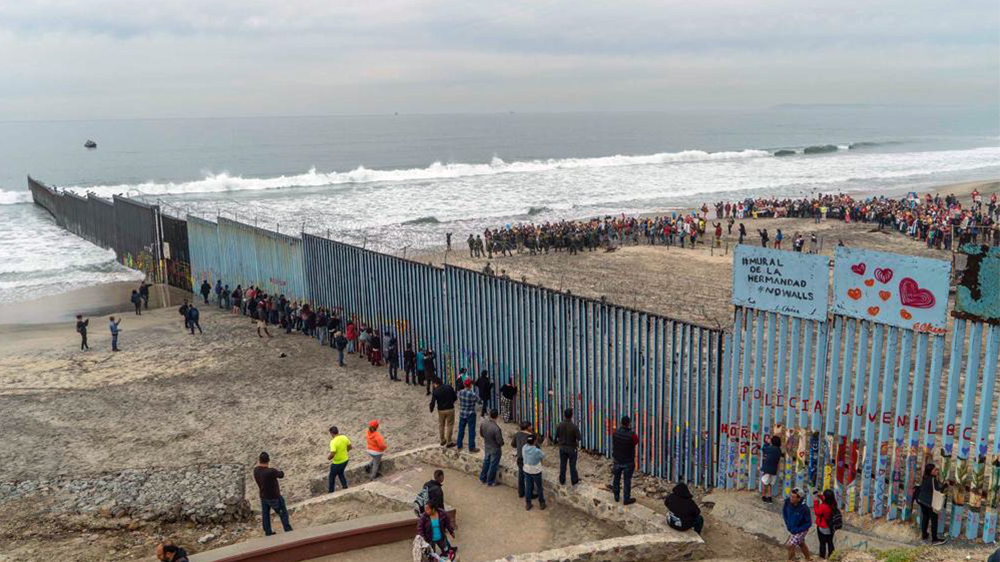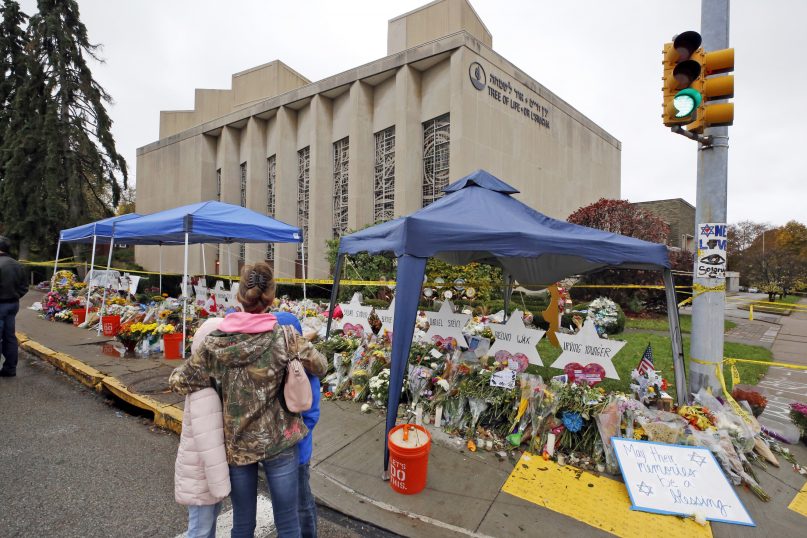(RNS) — The brutality of anti-Semitism in several forms dominated the top 10 news stories related to Jews and Judaism this year. But there were important and even happy developments as well.
1. The Tree of Life synagogue shooting
The “slaughter of the innocents” in a Pittsburgh synagogue in October was the single worst anti-Jewish attack in U.S. history, with 11 worshippers killed (among them were two of my cousins, Cecil and David Rosenthal). The swift public revulsion and denunciation of the massacre cut across all religious, ethnic and racial boundaries and resulted in a vast outpouring of support for the American Jewish community.
2. U.S. embassy moves to Jerusalem
In May, the U.S. embassy in Israel officially relocated from Tel Aviv to Jerusalem, as President Trump followed through on a December 2017 announcement. The move, met with both celebration and foreboding from political and faith leaders at the time, has been largely overwhelmed by other events, including violent attempts to breach the Jewish state’s borders by Palestinians in Gaza, Iran’s continued support of the brutal Syrian regime and the terrorist group Hezbollah based in Lebanon, and the discovery of several Hezbollah secret military tunnels that encroached into Israeli territory. Though Saudi Arabia’s King Salman was among those who criticized the embassy move, Israel strengthened its diplomatic outreach to Saudi Arabia this year.
3. Increase in anti-Semitic incidents
There was a sharp rise of overt anti-Semitic acts in both Europe and the United States in 2018. In the U.S., besides the Tree of Life shootings, a mural of the Star of David was defaced at Duke University in North Carolina and the office walls of a psychologist and Holocaust scholar at Columbia’s Teachers College in Manhattan were sprayed with anti-Semitic graffiti.
In Europe, swastikas and other graffiti expressing hatred for Jews appeared on public buildings, cemeteries and synagogues in Germany and France.
Two separate polls in Europe found that 1 in 4 Europeans expressed anti-Semitic views. At the same time, 38 percent of Jews living in Europe considered leaving the politically unstable continent because of the growing number of right-wing governments and ultra-nationalist movements.
4. U.S. withdraws from Iran nuclear deal
In September, the Trump administration withdrew from the 2015 Iran nuclear agreement, which had received significant support from American Jews. The administration also closed the Palestinian Liberation Organization (PLO) office in Washington, which had served as an unofficial embassy. The rationale for the move appeared to be to put pressure on the Palestinian Authority to cooperate with the administration’s peace plan. But as of the end of December, that long-anticipated “deal of the century” had not been unveiled.
5. The growing split between American Jews and Israel
There was much public worry about reports of a “parting of the ways” between Israel and some sectors of the American Jewish community over issues such as religious pluralism, the treatment of women and the widening cultural differences between the two countries. The largest number of the world’s Jews now lives in Israel, a trend likely to accelerate as a result of that nation’s increasing Jewish birth rate.
6. Faith leaders protest at the U.S.-Mexico border
Rabbis joined Christian and Muslim religious leaders in social justice pilgrimages to America’s long border with Mexico to protest the detention centers and harsh new U.S. immigration policies that separated children from their asylum-seeking Central American parents.

People protest against U.S. immigration policies on the American side, right, of the U.S.-Mexico border in Southern California on Dec. 10, 2018. RNS photo by Jair Cabrera Torres
7. Jewish women advance in elections
U.S. Rep. Jacky Rosen was elected to the U.S. Senate from Nevada, the third Jewish woman to attain the upper chamber. Rosen supporters claimed that her success a few years ago as a synagogue president was excellent preparation for the complex political scene in Washington. Claudia Sheinbaum Pardo became mayor of Mexico City, the largest city in North America.
8. Canada apologizes for refusing refugees from Nazi persecution
In November, Prime Minister Justin Trudeau offered a formal apology about the fate of the 907 Jewish passengers aboard the S.S. St. Louis, which departed Hamburg in May 1939 in a frantic search for a safe haven. Turned back by Cuba, the United States and Canada, the St. Louis returned to Europe where more than 250 of the passengers lost their lives in the Holocaust. Trudeau, addressing Canada’s House of Commons, declared: “We are sorry for the callousness of Canada’s response. We are sorry for not apologizing sooner.” He met with Ana Maria Gordon, the only St. Louis survivor living in Canada, and talked with her and her family about the need to actively combat anti-Semitism.
9. Hebrew Union College hires a layperson as president
For the first time since its founding 143 years ago, the Hebrew Union College-Jewish Institute of Religion, Reform Judaism’s flagship academic institution, will have a president who is not a rabbi. Andrew Rehfeld, a political science professor and director of the St. Louis Jewish Federation, will assume his new duties April 1. The school has facilities in Cincinnati, Jerusalem, Los Angeles and New York City. Rehfeld will succeed the late Rabbi Aaron Panken, who was killed in an airplane crash last May.
10. Three notable deaths
Three extraordinary rabbinic colleagues died in 2018: Rachel Cowan, who led the Institute of Jewish Spirituality; Aaron Panken, Hebrew Union College-Jewish Institute of Religion president; and David Posner, rabbi emeritus of New York City’s Temple Emanu-El, who had served what The New York Times called “the flagship Reform synagogue for 40 years.”
(Rabbi A. James Rudin is the American Jewish Committee’s senior interreligious adviser and the author of “Pillar of Fire: A Biography of Rabbi Stephen S. Wise,” published by Texas Tech University Press. He can be reached at jamesrudin.com. The views expressed in this commentary do not necessarily reflect those of Religion News Service.)





